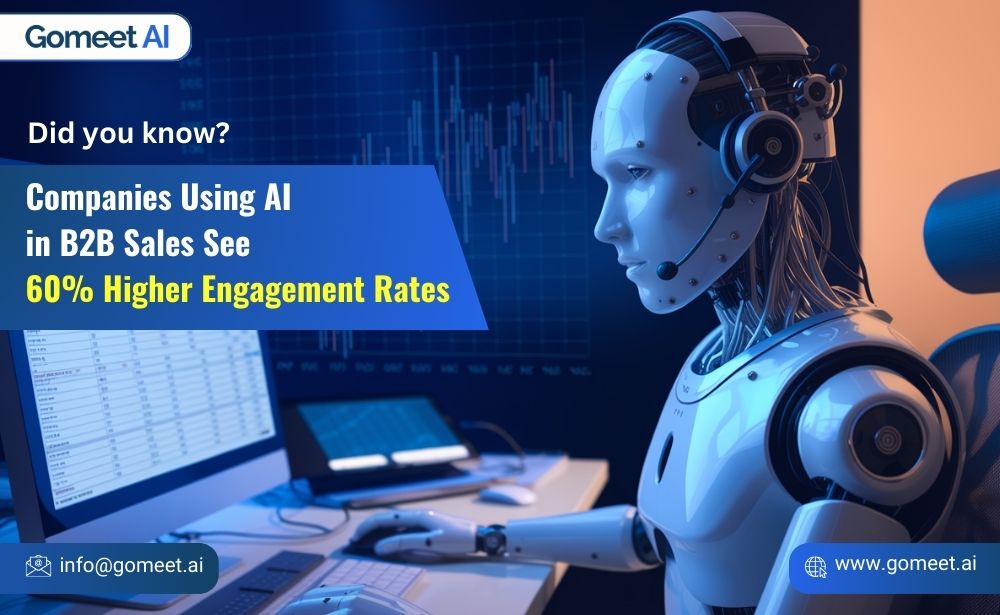The traditional one-size-fits-all approach to outreach and engagement no longer resonates with today’s decision-makers, particularly in B2B, where purchases are often complex and high-value. However, AI B2B sales tools have become a transformative approach, enabling sales teams to take personalization to a new level.
AI-powered solutions are capable of hyper-personalized outreach—delivering custom-written emails, creating tailored landing pages, developing personalized pitch decks, and offering solutions that align precisely with a potential customer’s business goals. This individualized approach improves engagement, shortens sales cycles, and ultimately drives better conversions.
In this blog, we’ll explore how AI tools for B2B sales are revolutionizing personalization and discuss practical ways to implement AI-driven strategies for better customer engagement.
The Personalization Challenge in AI B2B Sales Tools
Personalization with AI for B2B sales can be more challenging than in B2C due to the complexity of the buying process. In B2B, multiple decision-makers are involved, the sales cycles are longer, and the stakes are higher. Crafting personalized messages and touchpoints for each individual in the decision-making chain can be time-consuming and labor-intensive, especially for large sales teams managing numerous leads.
Additionally, the information needed to personalize outreach effectively—such as specific pain points, business challenges, and industry trends—requires careful analysis of large datasets. Many sales teams struggle to gather, analyze, and act on this data in real-time, resulting in impersonal, ineffective outreach that does little to capture attention or foster engagement.
This is where AI tools for B2B sales step in, providing scalable solutions to personalize without sacrificing quality or relevance.
How AI B2B Sales Tool Enables Hyper-Personalized Outreach
AI B2B sales software leverages data to automate and scale personalization efforts. By analyzing customer behaviors, industry patterns, and historical data, AI sales tools can craft highly personalized emails, landing pages, and sales materials that speak directly to the unique needs of a business. Let’s look at how AI enhances various elements of B2B outreach.
1. AI-Generated Emails: Personalized at Scale
Writing personalized emails for hundreds of prospects can be a daunting task, especially when each prospect requires a unique message that addresses their specific needs. AI-generated emails simplify this process by analyzing key data points about each lead and crafting tailored messages.
How it works:
- AI tools for B2B sales review data on past interactions, industry trends, and the prospect’s business needs to create email content that feels personal and relevant.
- AI-generated emails can include customized subject lines, greetings, and body content that addresses the recipient’s pain points directly.
- These emails also integrate dynamic fields that adapt to each recipient, ensuring that no two emails are exactly the same.
Benefits of AI-generated emails:
- Time Efficiency: AI dramatically reduces the time needed to create personalized emails for each lead, allowing sales teams to focus on higher-value tasks.
- Increased Engagement: Personalized emails have higher open rates, click-through rates, and response rates, as they resonate more with recipients.
- Scalability: AI makes it possible to scale personalized email campaigns without losing the individualized touch that prospects expect.
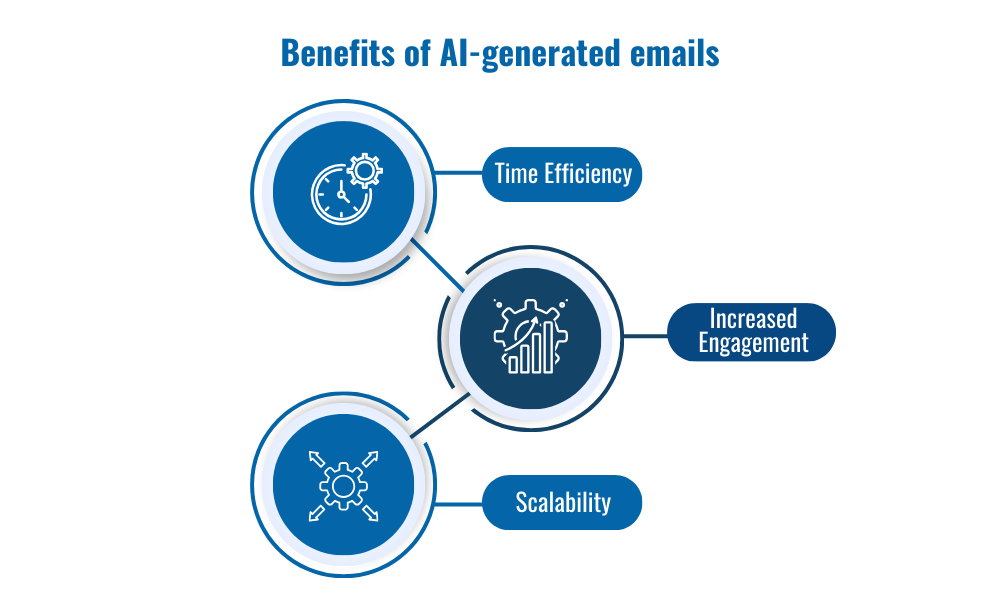
2. Personalized Landing Pages: Tailored to Each Prospect
Landing pages are a crucial touchpoint in the B2B sales funnel. They provide prospects with detailed information about your product or service and are often where potential buyers make decisions to move forward or abandon the process. However, generic landing pages can fail to engage prospects who are looking for solutions specific to their industry or challenges.
How AI personalizes landing pages:
- AI in B2B sales creates dynamic landing pages that adjust content based on the prospect’s industry, company size, and specific needs.
- These landing pages can feature case studies, testimonials, and product information that align directly with the prospect’s pain points and business goals.
- Personalization extends to visuals, copy, and even call-to-action (CTA) buttons, which can be customized based on the prospect’s engagement level and buying stage.
Benefits of personalized landing pages:
- Higher Conversions: Personalized landing pages show prospects that you understand their specific needs, making them more likely to convert.
- Improved Engagement: Prospects spend more time on landing pages that feel relevant and tailored to their challenges.
- Better Lead Qualification: Personalized landing pages can collect more targeted data, helping sales teams qualify leads more accurately.
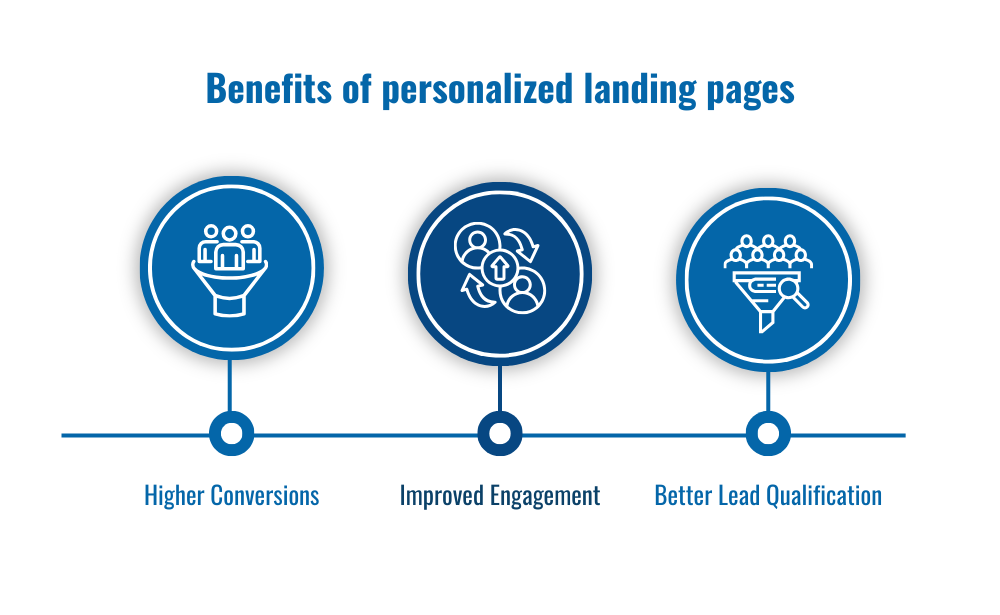
3. AI-Powered Pitch Decks: Crafting Tailored Solutions
Pitch decks are a critical tool in the B2B sales process, often used during presentations or meetings to showcase a product or solution. A well-crafted pitch deck should speak directly to the prospect’s business challenges and demonstrate how your solution can solve their problems.
How AI enhances pitch deck personalization:
- AI tools for B2B sales gather insights from CRM data, industry reports, and competitor analysis to create pitch decks tailored to the specific needs of each prospect.
- These decks can feature personalized data points, case studies from similar companies, and tailored ROI projections.
- AI can also adjust the tone and focus of the pitch deck based on the decision-maker’s role in the company, ensuring that the messaging resonates with their priorities.
Benefits of AI-powered pitch decks:
- More Relevant Pitches: Tailoring each pitch deck ensures that prospects see the value in your solution from their specific perspective.
- Faster Turnaround: AI can generate customized pitch decks quickly, giving sales teams the agility they need to respond to opportunities.
- Better Conversion Rates: Personalized pitches make a stronger case for your product, increasing the chances of closing the deal.
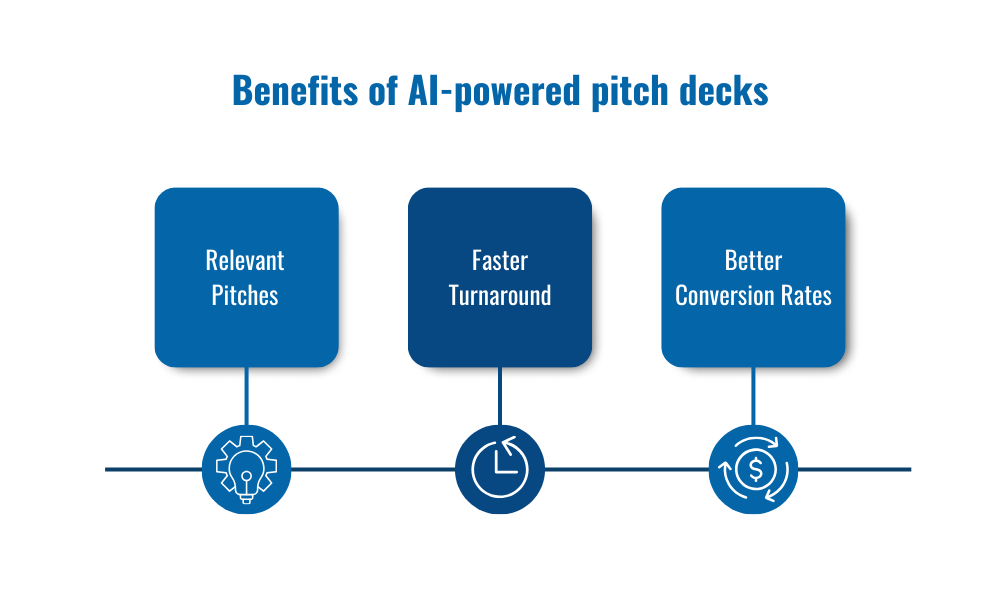
4. AI-Driven Solutions: Recommending the Right Fit
In B2B sales, no two customers are exactly alike. Each business has its own unique set of challenges, requirements, and goals, and your solutions must reflect that. AI tools for B2B sales help sales teams recommend tailored solutions to prospects based on deep data analysis.
How AI-driven solutions work:
- AI can analyze a prospect’s business data, such as their industry, size, market position, and specific pain points, to recommend the best-fit products or services.
- AI can also compare the prospect’s needs to previous successful implementations with similar clients, ensuring that the solution offered is relevant and likely to succeed.
- These recommendations are often delivered in real-time, allowing sales reps to provide immediate, data-backed suggestions during meetings or follow-ups.
Benefits of AI-driven solutions:
- Greater Customer Satisfaction: By offering tailored solutions, you increase the likelihood that the customer will see value in your product.
- Informed Decision-Making: AI recommendations are based on data, giving prospects confidence in the solution you’re offering.
- Shorter Sales Cycles: Tailored solutions address the prospect’s needs more directly, often leading to quicker decision-making and faster conversions.
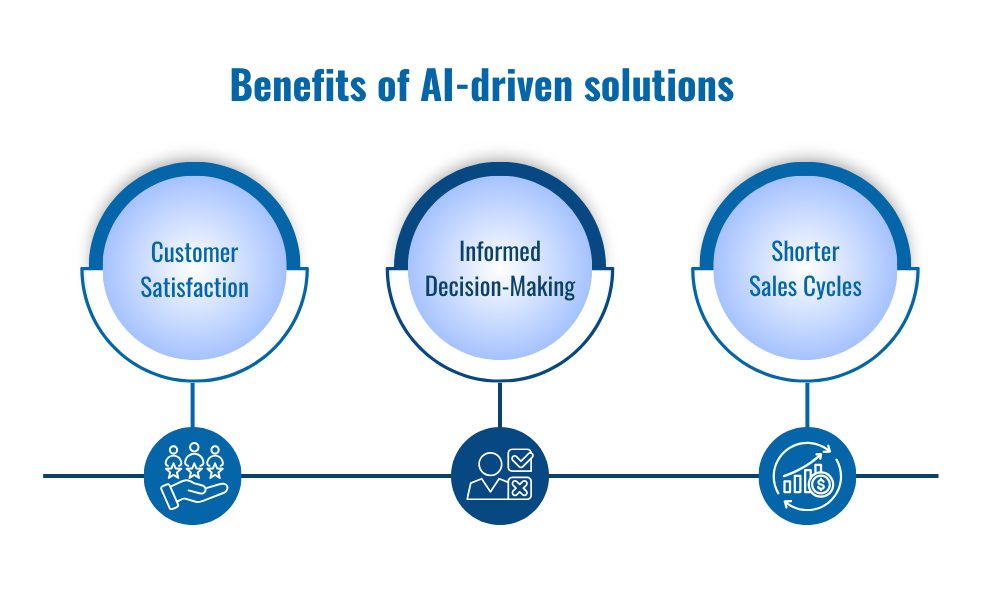
Ways AI is Changing B2B Sales Personalization
While personalization is key to customer engagement in B2B sales, the challenges of scaling and managing it manually can overwhelm even the best sales teams. AI in B2B sales not only helps overcome these challenges but does so efficiently and effectively. With AI-generated emails, personalized landing pages, tailored pitch decks, and AI-powered solutions, B2B companies can engage prospects with the right message at the right time.
Conclusion
AI in B2B sales is no longer a luxury—it’s a necessity in the competitive B2B sales landscape. Sales teams that leverage AI to tailor their outreach, content, and solutions will see greater engagement, shorter sales cycles, and ultimately, higher conversion rates.
If you’re looking for ways to personalize your B2B sales strategy at scale, consider exploring the AI-powered solutions available through Gomeet AI. Visit our website for more details.

